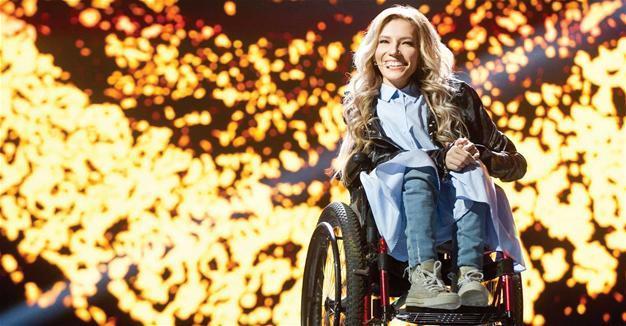National rivalries behind Eurovision kitsch
PARIS - AFP
 Behind the kitsch and glitz of the Eurovision Song Contest, to be hosted on May 13 by Kiev, lie a host of geopolitical tensions.
Behind the kitsch and glitz of the Eurovision Song Contest, to be hosted on May 13 by Kiev, lie a host of geopolitical tensions.Created by western public broadcasters as a catalyst to European unity in 1956, the songfest has since become an echo chamber for national rivalries.
In the latest example, Moscow and Kiev clashed this year over Russia’s contest choice.
As a result, Ukraine slapped an entry ban on Yulia Samoilova, angry that she gave a concert in Crimea after Moscow annexed the peninsula in 2014.
The ensuing row led to a decision by the organizers in the European Broadcasting Union (EBU) to drop Russia from the contest.
Disputes between Russia and its former Soviet republics have often been a problem at Eurovision.
In Stockholm in May 2016, Russia protested the victory of Ukrainian singer Jamala as political. Her ballad “1944” about the deportation of the Crimean Tatars by Soviet authorities during World War II was widely seen as a swipe at Moscow over its annexation of the peninsula. Russian singer Sergei Lazarev, the clear favorite with bookmakers and the public, was beaten into third place.
At the 2014 competition in Copenhagen, just two months after the annexation, Russia’s Tolmachevy Sisters were booed by the audience in the final.
In contrast, Austria’s bearded drag queen Conchita Wurst was wildly cheered and went on to win the contest. Her victory was seen as a thumbing of the nose at Russian President Vladimir Putin, who had signed a law banning “gay propaganda.”
On several occasions, to avoid political tensions, participants have been called on to change or modify their songs.
Many perceived the 2015 entry by Armenia, originally called “Don’t Deny,” to be a direct reference to the 100th anniversary of the mass killing of Armenians by Ottoman forces, which Turkey refuses to recognize as genocide. In the end, Armenia changed the title to “Face the Shadow” to remove any suggestion of political intent.
Georgia attempted to join the 2009 contest in Moscow with the song “We Don’t Wanna Put In,” but the EBU rejected the entry on the basis that it was an obvious wordplay on Putin, and came after the war between Russia and Georgia in August 2008.
Two years earlier Israel sent a song entitled “Push the Button” in a sign of the Jewish state’s mounting anxieties about archfoe Iran’s nuclear ambitions.
Numerous diplomatic incidents have overshadowed the contest, from Austria’s boycott of the 1969 event because it was being held in dictator Francisco Franco’s Spain, to the refusal by Armenia to take part in the 2012 edition in rival neighbor Azerbaijan. But it is the Cold War that has most marked the contest.
Communist Yugoslavia’s entry into Eurovision in 1961, barely six years after the contest was first launched, was seen as demonstrating that it was the Eastern European nation most open to Western cultural influences.
Meanwhile, in 1968, when Soviet tanks crushed the Prague Spring, Austria sent Czech singer Karel Gott as its representative.
After the fall of the Iron Curtain, Eurovision gained even greater political significance as countries of the former Eastern bloc began joining the EBU and taking part.
















